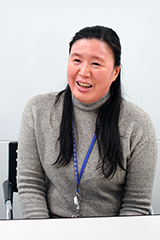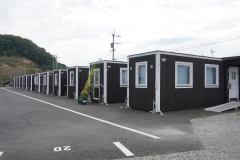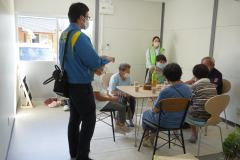Interview With Research Fellow Lisette Robles: Researching Human Security Amid the COVID-19 Crisis
2022.06.13
The COVID-19 pandemic has complicated field research, but it has also presented an opportunity to understand how people empower themselves amid overlapping disasters, including the pandemic and extreme weather events. We interviewed Lisette Robles, a Filipina research fellow who has experience researching disaster displacement and is now taking part in the project “Human Security and the Practices of Empowerment in East Asia.”

—Please tell us about yourself.
I’ve been in Japan for 11 years. Before coming to Japan, I was a college librarian in the Philippines. I was a recipient of a Japanese government scholarship in 2011, which gave me the chance to research and pursue graduate studies in Japan. The Great East Japan Earthquake became a pivotal point in my academic and professional direction. I earned my master’s and doctorate degrees at Japanese universities, where my research focused on migrants’ social capital in relation to disaster risk reduction and recovery. These were substantiated by studies on Filipino students and their narratives of the disaster, the importance of migrants’ networks in disasters, and a study of people displaced by Typhoon Haiyan in the Philippines in 2013. After finishing graduate school in 2017, I joined JICA Ogata Sadako Research Institute for Peace and Development as a part-time research assistant for the ”Comparative Study of Humanitarian Crisis Management from the Perspective of Bilateral Cooperation Agencies” research project. The theme was very interesting as it overlapped with my research interests. I guess I was in the right place at the right time with a suitable research background when they were looking for a research fellow. In 2019, I became a research fellow and became part of the project "Human Security and the Practices of Empowerment in East Asia."
—Please give us a brief definition of the term "empowerment" in the project's title.
First, it is important to establish how it relates to human security. There is no single definition for human security, but the broader definition encompasses the “freedom from fear, freedom from want, and freedom to live a life of dignity.” Its operational framework combines top-down protection and bottom-up empowerment. Top-down protection includes strategies and mechanisms by governments, international agencies, NGOs, and other stakeholders to safeguard people from critical and pervasive threats. As for bottom-up empowerment, this refers to the community’s capacity to be resilient to challenging times. The state and other stakeholders cannot constantly provide for everything. For sustainable and stable recovery, it must be complemented by people actually taking part and taking action to recover from a disaster or crisis. There are certain situations and conditions in which people find ingenious ways to confront crises and be resilient. And I think that’s good, but it also needs to be enabled. For communities to survive and bounce back from any crisis, they also needed support from non-state actors and some other enablers to recognize their “agency” or their skills and capacity to address their stresses. For example, migrant groups can share and exchange crisis information within their network during natural-hazard-induced disasters. Likewise, in refugee camps where people are in protracted displacement, collective effort to involve women in activities for economic development can also be seen. The thing with empowerment is that it is very different for every context. That’s what our study is trying to figure out.
This broadness of the human security concept has its advantages and drawbacks. Human security is comprehensive, recognizing a wide range of threats and vulnerabilities and engaging multiple actors and the communities to respond. But because of this, terms like “empowerment” and "dignity" can't be defined in a clear-cut way because the practice can be different from one community to another depending on different contexts, be it conflicts, disasters, infectious diseases, or climate-change challenges. Nevertheless, because of this inclusive feature of the concept, we can explore a variety of different practices in different contexts.
—Please tell us about the Human Security and Practices of Empowerment project you are part of.
JICA Ogata Research Institute has already conducted past research on human security, looking at the norms and practices in East Asia, which affirms the explicit presence of protection in addressing the insecurities in the region. Our research on “empowerment “complemented these studies and aimed at understanding how it develops for different vulnerable communities. Originally, the plan was for researchers to go into the field in various countries and do some immersive work, including grassroots interviews, to learn how people are coming together and doing more to be resilient to different circumstances. But in 2020, the pandemic drove us to reconsider our research and explore alternative data gathering. COVID-19 has altered our research plans, but it has also enriched the study because it brought us to the theme of examining resilience amid overlapping or cascading threats or disasters. We had to redesign our project, considering how to collect data effectively but safely for the research project during the pandemic while ensuring it remains aligned to exploring bottom-up empowerment for vulnerable and marginalized communities. Each country and research site considered in the project would have specific requirements, and it was a learning experience both for the researchers and project management members to navigate that. So far, we have completed interim working reports, which include country-level overviews of the COVID-19 situation and human insecurities in different countries included in the project. It serves as Level 1 of our human security analysis before we dive into the specifics of empowerment. Our project includes case studies on urban poverty in Vietnam, food security of internally displaced persons (IDPs) in Indonesia, environmental pollution in Indonesia, and the impact of the pandemic on old people in Thailand. We also have case studies with a geographical concentration in the Philippines on gender, sexual and reproductive health, and peace and justice in Mindanao. All cases are explored and analyzed within the context of the pandemic. I am researching disaster displacement in Kuma Village, Kumamoto, Japan, resulting from the 2020 flooding and landslides amid COVID-19.
—What challenges have you encountered in conducting your research?
For my research, I was originally considering exploring how communities experiencing chronic flood-induced displacement in Myanmar overcome their various insecurities. There was already logistically planning on carrying out remote research, i.e., hiring a local research assistant. However, due to the coup in 2021, I had to rethink and consider not just the research but the safety of whoever would be supporting the research. Given the complexities of COVID-19 and the coup, we decided to cancel the research in the area, at least for this project.
But as we know, disasters don’t wait, and while we are still facing the pandemic here in Japan, there was the heavy rain in 2020 that flooded several areas in Southern Japan, including Kuma Village in Kumamoto Prefecture. River water rose beyond usual, damaging several homes and displacing residents in the village. Months after the flooding, several residents are staying in temporary housing. Since the state of emergency was declared in the wake of the COVID-19 pandemic, it was difficult for me to travel to Kumamoto at that time. So, like the other case studies, we needed to hire a local research assistant who could directly conduct our fieldwork in Kumamoto. In the beginning, we were communicating remotely. But when the COVID-19 situation improved and restrictions were lifted, I had the chance to go to Kuma Village for fieldwork twice. However, with another surge of COVID-19 cases, this time with the Omicron variant, a third field visit had to be canceled. It is important that during field visits, you are tuned in to the needs of the people who bear the largest brunt of a crisis. So, we took the precaution to ensure that the community won’t feel insecure about having someone outside come in.

Temporary housing in Kuma Village, Kumamoto Prefecture, Japan
—Can you give an example of how the displaced residents in Kuma Village displayed their empowerment during difficult times?
My research is focused on the displaced residents staying in temporary housing. This is a transitionary period before they move to their permanent homes. This temporary housing is the space for the residents to begin their recovery. For example, the temporary housing includes what is called "Minna no Ie" (house for everyone), a community center. That is adapted from previous disasters and is a place for people to gather and plan how to move forward. But the COVID-19 pandemic has prevented people from using it to get together, posing insecurity in another form. And yet, at the same time, we witnessed an example of empowerment — the people affected by the disaster voluntarily going to the homes of other victims to check on them, especially older people, to see if they need support. And the last time we visited, we saw people gathering together, observing social distancing and safety protocols, in an open space in the temporary housing to play sports as a way of developing the camaraderie they were missing from being unable to gather in the "Minna no Ie." But there are still a lot of gaps in understanding how to move to a different place amid the COVID-19 pandemic.

People are gathering together at a community center in Kuma Village
—How do you hope this research contributes to empowering the vulnerable on a larger scale?
I think people have the impression that human security is relevant only to countries in more difficult conditions and most developing countries. However, human security is universal. Regardless of the level of development and geography, people can experience insecurities, which can threaten people’s lives, livelihoods and dignity. Even in a country like Japan, there are segments of the population that are vulnerable and marginalized. And that can be observed for those displaced by extreme weather events and geophysical hazards. This is something to think about and reconsider. Japan has inarguably multiple volumes worth of best practices to refer to and share when facing disasters. But for a disaster to happen during a pandemic, it tested its response to the combined crises (the impact of flooding and COVID-19) and to the pre-disaster insecurities (i.e., rapidly aging population, rural depopulation) that the affected population face. How Japan addresses this challenge is something that can provide examples of efforts to empower communities during similar crises. It is important to consider that each community or population would have a unique empowerment narrative as they have their own sets of agency and conditions to respond to their insecurities. At the least, it can provide a sample of best practices that can serve as a useful reference for other communities in responding to similar challenges.
—What will be the tangible outputs from the project?
The preliminary output for this project is the working reports available on the JICA Ogata Research Institute website. These are bird’s eye views of the human security conditions in each case study site, identifying the COVID-19 situation, the accompanying insecurities brought by the pandemic, and the protection initiatives enacted, if any. The final output of this project is a book publication putting together all the observable developments of empowerment in all the case studies mentioned. Now we are in the writing process. We acknowledge the timeliness of this contribution to the current crisis, and so we want to have it ready as soon as possible.
—Will the human security concept continue to hold its appeal?
Individuals and communities continue to face insecurities in various forms, and thus human security remains relevant. Some threats are explicit, others not, and human security is an essential approach to responding to these threats – placing vulnerable people at the core of top-down protection and bottom-up empowerment. This COVID-19 pandemic is a piece of concrete evidence of how certain threats can affect people extensively. Though we are affected by this to varying degrees, it has a cascading impact on different dimensions of our lives – our health, work, family, community relations, and to a larger extent, our politics. So that’s what the pandemic has made clear. It affects people disproportionately and indiscriminately and often has a cascading effect on top of other insecurities. Some people were already in poverty, and COVID-19 exacerbated it. Others are coping with the pandemic, and then they were hit by a typhoon or another crisis. That makes human security consistently important. And for JICA, as a development agency, human security provides the substance, the mission itself. It’s in JICA’s mission to provide quality growth and human security when they provide cooperation and assistance in other countries. Thus, I think these explorations of the elements of human security, like empowerment, make us better understand the concept and find the best way to utilize the approach. I think the concept will hold its appeal as a tool for analyzing and explaining insecurities people face. The evidence will enable us to facilitate communication for more effective and inclusive policymaking.

事業事前評価表(地球規模課題対応国際科学技術協力(SATREPS)).国際協力機構 地球環境部 . 防災第一チーム. 1.案件名.国 名: フィリピン共和国.

事業事前評価表(地球規模課題対応国際科学技術協力(SATREPS)).国際協力機構 地球環境部 . 防災第一チーム. 1.案件名.国 名: フィリピン共和国.

事業事前評価表(地球規模課題対応国際科学技術協力(SATREPS)).国際協力機構 地球環境部 . 防災第一チーム. 1.案件名.国 名: フィリピン共和国.

事業事前評価表(地球規模課題対応国際科学技術協力(SATREPS)).国際協力機構 地球環境部 . 防災第一チーム. 1.案件名.国 名: フィリピン共和国.

事業事前評価表(地球規模課題対応国際科学技術協力(SATREPS)).国際協力機構 地球環境部 . 防災第一チーム. 1.案件名.国 名: フィリピン共和国.